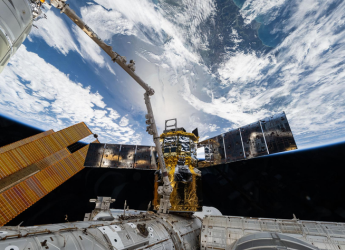- Home
- Science
- Science News
- New Nasa Launch Control Software Late, Millions Over Budget
New Nasa Launch Control Software Late, Millions Over Budget

Nasa's own inspector general conducted the audit at Florida's Kennedy Space Center, where the agency hopes to launch its next-generation rocket on a test flight in 2018.
The goal is to send astronauts to Mars in the 2030s, using this supersize Space Launch System, or SLS, rocket and an Orion capsule. The 2018 SLS premiere will include an unmanned Orion; the first Orion with a crew should launch five years later.
Nasa has agreed to an independent review once software is delivered for the 2018 test flight. In the meantime, officials said they have instituted improvements. Inspector General Paul Martin deems that satisfactory and considers the matter resolved.
Software needed to support SLS and Orion is experiencing the same startup trouble as previous command and control software programs, the audit found. Development of this new launch control software is now projected to exceed $207 million, 77 percent above 2012 projections.
The software won't be ready until fall 2017, instead of this summer as planned, and important capabilities like automatic failure detection, are being deferred, the audit noted. The system is vital, needed to control pumps, motors, valves and other ground equipment during countdowns and launches, and to monitor data before and during liftoff.
Nasa decided to write its own computer code to "glue together" existing software products a decade ago - while space shuttles still were flying and commercial shippers had yet to service the space station. Both delivery companies, SpaceX and Orbital ATK, rely on commercial software, the audit noted.
Commercial software products would be a better option for Nasa as well, according to the audit, especially given recent advances in the area.
The ground systems development and operations program's "reluctance to change course reflects a cultural legacy at Nasa of over-optimism and over-promising what the agency can achieve in a specific timeframe," the report stated.
A successful Orion orbital test flight, in 2014, used United Launch Alliance's unmanned Delta IV rocket.
For details of the latest launches and news from Samsung, Xiaomi, Realme, OnePlus, Oppo and other companies at the Mobile World Congress in Barcelona, visit our MWC 2026 hub.
Related Stories
- Samsung Galaxy Unpacked 2026
- iPhone 17 Pro Max
- ChatGPT
- iOS 26
- Laptop Under 50000
- Smartwatch Under 10000
- Apple Vision Pro
- Oneplus 12
- OnePlus Nord CE 3 Lite 5G
- iPhone 13
- Xiaomi 14 Pro
- Oppo Find N3
- Tecno Spark Go (2023)
- Realme V30
- Best Phones Under 25000
- Samsung Galaxy S24 Series
- Cryptocurrency
- iQoo 12
- Samsung Galaxy S24 Ultra
- Giottus
- Samsung Galaxy Z Flip 5
- Apple 'Scary Fast'
- Housefull 5
- GoPro Hero 12 Black Review
- Invincible Season 2
- JioGlass
- HD Ready TV
- Latest Mobile Phones
- Compare Phones
- Nothing Phone 4a Pro
- Infinix Note 60 Ultra
- Nothing Phone 4a
- Honor 600 Lite
- Nubia Neo 5 GT
- Realme Narzo Power 5G
- Vivo X300 FE
- Tecno Pop X
- MacBook Neo
- MacBook Pro 16-Inch (M5 Max, 2026)
- Tecno Megapad 2
- Apple iPad Air 13-Inch (2026) Wi-Fi + Cellular
- Tecno Watch GT 1S
- Huawei Watch GT Runner 2
- Xiaomi QLED TV X Pro 75
- Haier H5E Series
- Asus ROG Ally
- Nintendo Switch Lite
- Haier 1.6 Ton 5 Star Inverter Split AC (HSU19G-MZAID5BN-INV)
- Haier 1.6 Ton 5 Star Inverter Split AC (HSU19G-MZAIM5BN-INV)

















